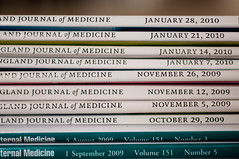Research preview: the historical case for vaccination
By Kristopher A. Nelson
in
February 2010
1100 words / 5 min.
Tweet
Share
I’m researching how the scientific and medical community presented and developed itself such that the public moved from rioting to cooperation with vaccination.
Please note that this post is from 2010. Evaluate with care and in light of later events.
 I am currently researching vaccination — especially smallpox vaccination — at the end of the 19th and beginning of the 20th centuries, and the connections of this historical period to today’s vaccination debates. More specifically, I’m looking at how the scientific and medical community presented and developed itself such that the public moved from rioting against vaccination (as in Milwaukee in 1894) to widespread, voluntary cooperation with vaccination (as in New York City in 1947). Achieving the level of cooperation found in New York required establishing the credibility of vaccination and, more generally, building the trust of the public in scientific medicine and in science itself.
I am currently researching vaccination — especially smallpox vaccination — at the end of the 19th and beginning of the 20th centuries, and the connections of this historical period to today’s vaccination debates. More specifically, I’m looking at how the scientific and medical community presented and developed itself such that the public moved from rioting against vaccination (as in Milwaukee in 1894) to widespread, voluntary cooperation with vaccination (as in New York City in 1947). Achieving the level of cooperation found in New York required establishing the credibility of vaccination and, more generally, building the trust of the public in scientific medicine and in science itself.
While my discussion may begin with historical cases, the modern repercussions are real. Unlike New York City in 1947, Americans today are not likely to line up to be vaccinated based on the recommendations of public-health officials. The trust that scientific medicine had in 1947 has been seriously compromised. Some of this can be blamed on revelations of abuses such as the Tuskegee Syphilis Study, or allegations of conflicts of interest on the part of researchers influenced by money funneled through the pharmaceutical industry. Anecdotal evidence, alongside well-documented cases of vaccine side-effects, further undermines public confidence, especially as the occurrence of many serious disease is reduced (measles) or eliminated (smallpox).
Regardless of which side of the vaccine debate one occupies, the rhetorical strategies for building credibility and trust are the same, and those strategies are exactly what I am interested in examining. Historically, how did scientific medicine’s approach lead to the adoption of vaccination as a key component of public health? And what can we learn from this history to help us critically evaluate the role of vaccination today?
To help focus my analysis on the above areas, I divided the areas of dispute into four categories: science, trust, religion, and medicine.
Analytic Areas of Dispute
 To help focus my analysis of how vaccination became accepted as a key component of public health, I am planning to divided the areas of historical dispute into four main categories: science, trust, religion, and medicine.
To help focus my analysis of how vaccination became accepted as a key component of public health, I am planning to divided the areas of historical dispute into four main categories: science, trust, religion, and medicine.
According to my scheme, a scientific dispute falls more-or-less within the boundaries of generally accepted science (of the time.) For example, arguments that vaccines simply do not work to protect a person against a target disease, that vaccines cause new problems or side effects (like autism), or that vaccines actually cause the target disease instead of preventing it.
Trust — a complex issue that I might spend more time on than the other areas — can sometimes be related to disputes about science or evidence, but generally involves a loss of confidence in government or other institutions. One can see this today on anti-vaccination Web sites, where opponents of vaccination argue that the government, scientists, and the medical industry are lying to the public, generally because they are profiting by selling vaccines. A failure of trust moves the dispute outside of standard scientific disagreement, but can sometimes be restored by recourse to independent review, additional studies, or other approaches deeply related to scientific methodology.
 Religion is another category of contention. In some cases, it can manifest itself in so-called “philosophical” objections to vaccination, but the main point is that this category encompasses essentially irrational beliefs that cannot be effectively countered by scientific means or improved trust. For example, some people argue that their religion forbids putting vaccines into their bodies. Others may simply not “believe” in modern, Western medicine, and instead favor naturopathic or similar approaches. Others may feel disease is “God’s will,” and that to vaccinate people goes against this.
Religion is another category of contention. In some cases, it can manifest itself in so-called “philosophical” objections to vaccination, but the main point is that this category encompasses essentially irrational beliefs that cannot be effectively countered by scientific means or improved trust. For example, some people argue that their religion forbids putting vaccines into their bodies. Others may simply not “believe” in modern, Western medicine, and instead favor naturopathic or similar approaches. Others may feel disease is “God’s will,” and that to vaccinate people goes against this.
A final category of disagreement revolves are medical issues. An individual may resist vaccination because they have a compromised immune system, are allergic to the vaccine, and so on. (Interestingly, in the contemporary United States, this is the only category of disagreement that is constitutionally mandated as an exception to mandatory vaccination, although many state laws offer additional exemptions).
Methods of Resistance
My next step is to look at the ways people have resisted vaccination. I have identified five so far: passive resistance, active legal resistance, active semi-legal resistance, active attack, and group opposition.
 Passive resistance may include simply not getting vaccinated, and often occurs when the perceived “cost” of getting vaccinated is higher than the “cost” of non-vaccination. Active legal resistance may involve seeking an exemption within both the spirit and the letter of the law, filing a lawsuit (as in Jacobson v. Massachusetts, a key 1905 Supreme Court case that established the constitutionality of mandatory vaccination programs), or lobbying the legislature to change the law. Active semi-legal resistance includes home schooling children to avoid required vaccination, or lying to get a religious exemption under the law. Active refusal may involve “civil disobedience” or even physically attacking doctors. Finally, group involvement means connecting with other resistors, including forming anti-vaccination leagues, creating anti-vaccination Web sites (in more modern times), or even physical confrontations at a group level, such as the rioting in Milwaukee in 1896.
Passive resistance may include simply not getting vaccinated, and often occurs when the perceived “cost” of getting vaccinated is higher than the “cost” of non-vaccination. Active legal resistance may involve seeking an exemption within both the spirit and the letter of the law, filing a lawsuit (as in Jacobson v. Massachusetts, a key 1905 Supreme Court case that established the constitutionality of mandatory vaccination programs), or lobbying the legislature to change the law. Active semi-legal resistance includes home schooling children to avoid required vaccination, or lying to get a religious exemption under the law. Active refusal may involve “civil disobedience” or even physically attacking doctors. Finally, group involvement means connecting with other resistors, including forming anti-vaccination leagues, creating anti-vaccination Web sites (in more modern times), or even physical confrontations at a group level, such as the rioting in Milwaukee in 1896.
My Research Path
 Going forward, my research will involve three distinct approaches. My first focus is on how the exemptions to mandatory vaccination — originally non-existent, but later enshrined in many states’ public-health laws — have been critical to maintaining public cooperation, and how such exemptions may be calibrated to foster such cooperation without undermining the potential benefits of the so-called “herd immunity.” Second, I intend to investigate and discuss the historical shift in perception of vaccination that led from rioting by vaccine resistors in 1896 Milwaukee, to limited legal resistance in 1904 Massachusetts, to virtually complete public cooperation in 1947 New York. And finally — building on my suggestion that rhetorical strategies by proponents of scientific medicine have been key — I intend to look at these strategies as utilized by both vaccine proponents and opponents from the late 1800s to today.
Going forward, my research will involve three distinct approaches. My first focus is on how the exemptions to mandatory vaccination — originally non-existent, but later enshrined in many states’ public-health laws — have been critical to maintaining public cooperation, and how such exemptions may be calibrated to foster such cooperation without undermining the potential benefits of the so-called “herd immunity.” Second, I intend to investigate and discuss the historical shift in perception of vaccination that led from rioting by vaccine resistors in 1896 Milwaukee, to limited legal resistance in 1904 Massachusetts, to virtually complete public cooperation in 1947 New York. And finally — building on my suggestion that rhetorical strategies by proponents of scientific medicine have been key — I intend to look at these strategies as utilized by both vaccine proponents and opponents from the late 1800s to today.
You
Thoughts? Reactions? Comments? Either contact me personally or leave a note in the comments below. Any suggestions or ideas about this research project would be very much appreciated!
Related articles by Zemanta
- Not enough patients receive vaccines and what doctors can do about it (kevinmd.com)
- Anti-vaccine activism, not autism activism (scienceblogs.com)
- Mumps outbreak in U.S. exceeds 1,500 cases (cbc.ca)
- Scientists choose citations for “discriminatory” reasons (inpropriapersona.com)